|
|
|
Sort Order |
|
|
|
Items / Page
|
|
|
|
|
|
|
| Srl | Item |
| 1 |
ID:
122123
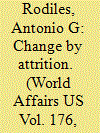

|
|
|
|
|
| Publication |
2013.
|
| Summary/Abstract |
Five years ago, hopes were high among Cuba watchers when Raúl Castro officially succeeded Fidel. There was particularly intense speculation about who would be named the next first vice president of the Council of State. Bets focused on two candidates: Carlos Lage Dávila, a bureaucrat in his late fifties, and José Ramón Machado Ventura, an apparatchik in his late seventies who had been a captain in the guerrilla war that brought the revolution to power in 1958. Which of the two men was chosen, observers theorized, would suggest Raúl Castro's orientation over the next five years and give a clue about whether Cuba's course would be Raulista (reformist) or Fidelista (status quo).
|
|
|
|
|
|
|
|
|
|
|
|
|
|
|
|
| 2 |
ID:
122129
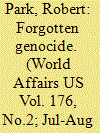

|
|
|
|
|
| Publication |
2013.
|
| Summary/Abstract |
North Korea's nuclear weapons test on February 12th was its third and most powerful to date. According to the Democratic People's Republic of Korea's state-controlled news agency, the test was carried out "using a miniaturized and lighter nuclear device with greater explosive force than previously." It was a wake-up call for some in the arms control community who have dismissed Pyongyang's nuclearization merely as a bargaining chip for monetary or material concessions and against regime change. The North Koreans are now playing in the big leagues, with a warhead small enough to be used on an intercontinental ballistic missile that, according to the regime, could potentially strike not only US bases in South Korea and Japan, but also Guam and the US mainland. Those who ritualistically condemned the test also ignored one of the issues that it was meant to obscure: while spending billions on its nuclear program, the Kim regime, in continuity with its dynastic predecessors, was also presiding over a state-induced famine and mass atrocities within its prison camp system that have taken on the proportions of a homemade genocide.
|
|
|
|
|
|
|
|
|
|
|
|
|
|
|
|
| 3 |
ID:
122122
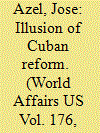

|
|
|
|
|
| Publication |
2013.
|
| Summary/Abstract |
The 2006 succession from Fidel Castro to his brother Raúl, programmed since the early days of the Cuban revolution, was efficient, effective, and seamless. The eighty-two-year-old Raúl, who recently announced that he will step down in 2018, is now orchestrating his own succession behind the scenes. But however the transition from the Castro era plays out, one outcome is off the table: that Raúl will emerge as a reformer to end the Communist era and inaugurate a new democratic and market-oriented Cuba.
|
|
|
|
|
|
|
|
|
|
|
|
|
|
|
|
| 4 |
ID:
122126


|
|
|
|
|
| Publication |
2013.
|
| Summary/Abstract |
French security officials arrested three Chechen Islamic extremists with ties to al-Qaeda this spring. The three were believed to be "days away" from carrying out attacks in France, Spain, and elsewhere in Europe, prosecutor François Molins said. He called it a "worrying trend."
|
|
|
|
|
|
|
|
|
|
|
|
|
|
|
|
| 5 |
ID:
122128


|
|
|
|
|
| Publication |
2013.
|
| Summary/Abstract |
If the level of domestic political repression in Vladimir Putin's Russia has not yet reached the scale of that in the Soviet Union-though several dozen Russian political prisoners are being held behind bars on fabricated charges-the level of officially sanctioned anti-Western agitation, and anti-Americanism in particular, is certainly comparable to the worst years of the Cold War. Hardly a day goes by without hate-filled reports on state television. Regime officials and senior legislators angrily accuse the United States of "interfering in Russia's internal affairs" through its supposed proxies inside the country, by which they, of course, mean Russian human rights groups and other nongovernmental organizations that are critical of the Putin regime. All NGOs that receive funding from abroad are required by a new law to label themselves as "foreign agents" (which, in the Russian public discourse, is synonymous with "spies") or face closure. Needless to say, these groups have refused to comply. (How could, for instance, Memorial, an organization co-founded by Andrei Sakharov to perpetuate the memory of victims of political repression, declare itself a "foreign agent"?) As a consequence, prosecutors are conducting disruptive raids on the offices of Russia's leading human rights groups, which they charge with violating this law.
|
|
|
|
|
|
|
|
|
|
|
|
|
|
|
|
| 6 |
ID:
122130
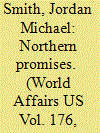

|
|
|
|
|
| Publication |
2013.
|
| Summary/Abstract |
"The nineteenth century was the century of the United States," Sir Wilfrid Laurier, Canada's prime minster from 1896 to 1911, stated midway through his term in office. He added his infamous prediction, "I think we can claim that it is Canada that shall fill the twentieth century."
|
|
|
|
|
|
|
|
|
|
|
|
|
|
|
|
| 7 |
ID:
122124
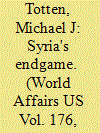

|
|
|
|
|
| Publication |
2013.
|
| Summary/Abstract |
"We Arabs," the late Lebanese historian Kamal Salibi once said to me in Beirut, "are not a warring people. We are a feuding people." That's generally true. The Israeli-Palestinian conflict looks far more like a Northern Ireland-style feud than a real war of the sort that tore apart the former Yugoslavia. The same goes for the chronic yet sporadic clashes in parts of Yemen, Libya, and Lebanon.
|
|
|
|
|
|
|
|
|
|
|
|
|
|
|
|
| 8 |
ID:
122127


|
|
|
|
|
| Publication |
2013.
|
| Summary/Abstract |
In April 2013, three people died and more than two hundred and sixty were injured in the Boston Marathon terror attack. At the same time in the UK, eleven men were sentenced for their roles in a large al-Qaeda-approved suicide plot in Birmingham to explode eight bombs concealed in backpacks, while members of another terror group were sentenced for a series of terrorism offenses, including potential attacks against British troops. A month later, a British soldier was indeed murdered on the streets of London by two radicalized men yelling, "Allahu akbar." These events are only the latest that show the US and the UK face very similar ideological challenges from terrorism. Yet the backgrounds of the individuals posing this challenge differ greatly, as two recent studies we have conducted show. One study, published earlier this year, covered all those convicted of al-Qaeda and al-Qaeda-inspired terrorism in US civilian and military courts and those who committed suicide attacks on US soil over a fifteen-year period. A similar study we published in 2011 covered Islamism-related offenses in the UK between 1998 and 2010.
|
|
|
|
|
|
|
|
|
|
|
|
|
|
|
|
| 9 |
ID:
122125
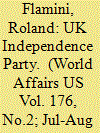

|
|
|
|
|
| Publication |
2013.
|
| Summary/Abstract |
The town of Eastleigh, in southeast England, doesn't normally make national news. It's old, but not antique. It was once known for its railroad industrial works that built powerful steam locomotives with names like King Arthur. But that was in the early twentieth century. Today, it's more of a dormitory town for larger, nearby cities like Southampton and Winchester. In March of this year, however, Eastleigh (population 120,700) dominated the political headlines and provided a preview of things to come, following a parliamentary by-election whose result seriously rattled the mainstream parties, particularly the governing Conservatives.
|
|
|
|
|
|
|
|
|
|
|
|
|
|
|
|
| 10 |
ID:
122131
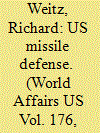

|
|
|
|
|
| Publication |
2013.
|
| Summary/Abstract |
In March 2013, US Secretary of Defense Chuck Hagel, citing the progress of North Korea's nuclear program, announced that the United States would be bolstering its missile defenses. Fourteen new ground-based interceptor missiles, known as GBIs, would be deployed to Alaska, augmenting the thirty already in silos there and in California. The Pentagon would develop a new two-stage GBI, as well as a more advanced version of the "kill vehicle," which interceptors carry to smash into adversary warheads ("hit-to-kill"). The Obama administration would be deploying a second advanced mobile radar system, the Army Navy/Transportable Radar Surveillance 2, in Japan. And Hagel even indicated that the administration would restructure its plans for US missile defenses in Europe, canceling the SM-3 IIB interceptor, the cornerstone of the fourth and final phase of its European Phased Adaptive Approach (EPAA), which had been announced in 2009 as a means of deploying more-advanced interceptors in Eastern and Central Europe specifically designed to defend the US homeland from intercontinental ballistic missiles launched from Europe, Eurasia, or the Middle East.
|
|
|
|
|
|
|
|
|
|
|
|
|
|
|
|
|
|
|
|
|